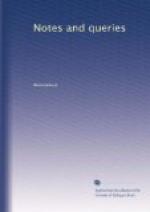“We must not look for the delicate apprehension and tact, which can only be formed in a highly polished state of society, nor for the indignation of insulted morality expressed by the ancients: it is altogether a caricature, not of finished individual portraits, but of a single type;—a clownish sensual German priest, his intellect narrowed by stupid wonder and fanatical hatred, who relates with silly naivete and gossiping confidence the various absurd and scandalous situations into which he falls. These letters are not the work of a high poetical genius, but they have truth, coarse strong features of resemblance, and vivid colouring.”
Ranke mentions another satire, which appeared in March, 1520, directed against John Eck, the opponent of Luther, the latter being regarded in the light of a successor of Reuchlin, under the title of Abgehobelte Eck, or Eccius dedolatus, “which, for fantastic invention, striking and crushing truth, and Aristophanic wit, far exceeded the Literae Obsc. V., which it somewhat resembled.” I have not yet been able to meet with this; but such high praise, from so judicious a critic, makes me very desirous to see and peruse it.
S.W. Singer.
Mickleham, July 3. 1850.
[Footnote 8: “Ubi primum exissent Ep. Ob. V. miro Monachorum applausu exceptae sunt apud Britannos a Franciscanis ac Dominicanis, qui sibi persuadebant, eas in Reuchlini contumeliam, et Monachorum favorem, serio proditus: quamque quidam egregie doctus, sed nasutissimus, fingeret se nonnihil offendi stylo, consulati sunt hominem.”—Erasm. Epist. 979.]
Epistolae Obscurorum Virorum.—Your Querist H.B.C. (Vol. ii., pp. 55-57.) will find, in the 53rd vol. Edinb. Rev. p. 180., a long article on these celebrated letters, containing much of the information required. It is worthy of remark, that in page 195. we are told
“In 1710 there was printed in London the most elegant edition that has ever appeared of these letters, which the editor, Mich. Mattaire, gravely represents as the productions of their ostensible authors.”
Now this edition, though neat, has no claim to be termed most elegant, which is hardly to be reconciled with what the reviewer says in a note, p. 210., “that the text of this ed. of 1710 is of no authority, and swarms with typographical blunders.”
The work on its first appearance produced great excitement, and was condemned by Pope Leo X. See Dict. des Livres Condamnes, &c., par Peignot, tom. ii. p. 218.
Many amusing anecdotes and notices are to be found in Bayle’s Dict. See particularly sub nomine Erasmus. Burton, in his Anatomy of Mel. pt. i. sec. 2. Mem 3 sub 6. citing Jovius in Elogiis, says,
“Hostratus cucullatus
adeo graviter ob Reuchlini librum qui
inscribitur, Epistolae Obscurorum
Virorum dolore simul et pudore
sauciatus, et scipsum interfecerit.”




